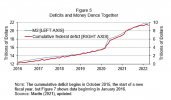Excellent Insightful questions.Twitter has competition for those who find it too restricting, and does also censor liberals.
I know we all hate "cancel" culture, but how would you feel about an "accountability" culture, where people who say things that a person considers vile would suffer from a lock of business from those who found it vile? How would that differ from "cancel" culture, as you see it?
1. Twitter: Agree but I do see an anti MAGA bias. And I’m extremely anti MAGA.
2. “Measured accountability” is how I would phrase it. We should not destroy someone based on their worst moment. Some extremists deserve to be destroyed, but sometimes people say an incredibly dumb thing that they don’t even believe. Measure the body of work and give decent people a second chance. There is a “herd hunt and destroy Red tooth and claw feeding frenzy” mentality that goes way overboard. okay
Also, some paint their opponents as evil over simple policy differences. I was against student loan forgiveness and got eviscerated about how much I hated poor college grads. Obama had a very nice speech on cancel culture that nailed the problem. The self righteous need to get off their high horses and treat people who think differently with empathy.



